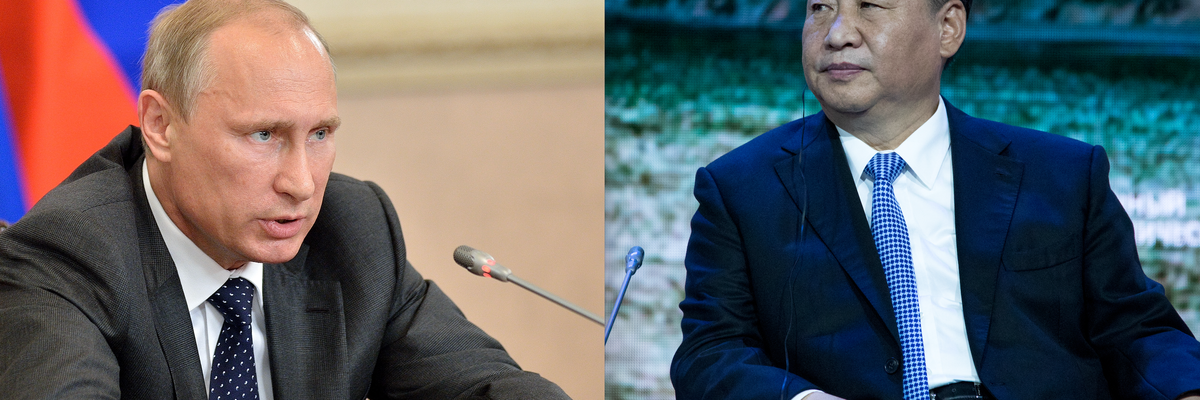The Russian invasion of Ukraine has put China in the crosshairs of U.S. policy makers as they seek Chinese assistance in isolating and sanctioning Russia. It should be clear, however, that China will not join the international coalition sanctioning Russia. It feels no obligation to cooperate with the United States, given Washington’s trade and technology wars against Beijing, its Taiwan policy, and its efforts to organize a global coalition to pressure China to accommodate U.S. interests.
Moreover, Russia and China, in addition to their close economic relations, have many common interests, including resistance to America’s ideological foreign policy and to its military presence on their peripheries. Hence, China has joined many countries, including U.S. security partners India and the Southeast Asian countries (except for Singapore) in maintaining normal economic relations with Russia. It also joined India in abstaining on the U.N. vote condemning the invasion.
Nonetheless, China has an interest in minimizing the impact of the invasion on its relationship with Europe and the United States. It wants to encourage continued European reluctance to support the U.S. trade war against China and avoid buttressing U.S. motivation to strengthen its own restrictions on its trade with China and its cooperation with Taiwan.
Thus, Chinese diplomats have not supported the Russian invasion. On the contrary, they have expressed opposition to Russian policy. Chinese Foreign Minister Wang Yi spoke with Ukraine Foreign Minister Dmytro Kuleba, expressing concern for Ukrainian civilian casualties and signaling Chinese support for Ukraine’s territorial integrity and sovereignty and for negotiations to end the war. The Chinese-led Asian Infrastructure Investment Bank and the New Development Bank have suspended all economic business with Russia. China has made clear its unhappiness with the Russian invasion.
But, as the war progresses, the United States and Europe will want China to do more than diplomacy. Should China enable Russia to circumvent banking sanctions, the United States may impose secondary sanctions on Chinese banks. And should China enable Russia to circumvent sanctions on technology exports to Russia, the United States will likely impose stricter regulations on Chinese corporations’ access to U.S. technologies and to the U.S. market. More generally, Chinese cooperation with Russia may lead to greater deterioration in U.S.-China relations and encourage Washington to further improve relations with Taiwan and strengthen its global economic and security coalition against China, including with Europe and with Japan and Australia. China will have to tread carefully; it will have to constrain its cooperation with Russia to pursue its interests regarding Europe and the United States.
Russia’s invasion of Ukraine has raised concern in the United States about possible Chinese risk-taking against Taiwan. With Washington’s focus on Ukraine, observers suggest that China may see an opportunity to realize the unification of Taiwan by force. On the one hand, this concern assumes that, in the absence of U.S. intervention, Taiwan would be an easy target, so that China could attack Taiwan at an acceptable cost.
But the mainland is fully aware that an amphibious invasion of Taiwan would pose severe logistical challenges and subduing a hostile population would likely require a costly and protracted war, undermining the legitimacy of the Chinese Communist Party and diverting Chinese resources from contending with U.S. maritime capabilities elsewhere in Asia.
Moreover, America’s protracted wars in Iraq and Afghanistan and the course thus far of Russia’s war in the Ukraine are likely to inspire caution in Beijing, whose leadership is no doubt aware that an invasion would very likely be followed by the kinds of very costly economic and diplomatic sanctions the United States, Europe, and other countries have imposed on Russia. The Russian invasion of Ukraine has not made the prospect of Chinese use of force against Taiwan an attractive option.
On the other hand, the United States is right to worry about its reputation in East Asia and the implications for its security. In response to a rising China, Washington has been trying to pivot to East Asia for over a decade but has found it difficult to extricate itself from conflicts in the Middle East and now finds itself committed to devoting more resources to Europe. Despite the U.S. imperative to resist the Russian invasion of Ukraine, now, more than ever, U.S. security partners in East Asia will question America’s capability and resolve to prioritize balancing the rise of China and contribute to their security. They will be more hesitant to expand security cooperation with the United States and more likely to accommodate Chinese interests in the competition between Beijing and Washington. American diplomacy and summits with East Asian leaders will not compensate for heightened U.S.-Russian conflict in a polarized Europe.
Unless the United States can step back and allow Europe to shoulder the burden of the resistance to the Russian invasion, China will ultimately benefit from the war in Ukraine. It must manage its Russia policy carefully to avoid U.S. and European hostility, but heightened U.S.-Russian competition and America’s entrenchment in European security affairs will contribute to ever greater China’s strategic influence in Asia.
















